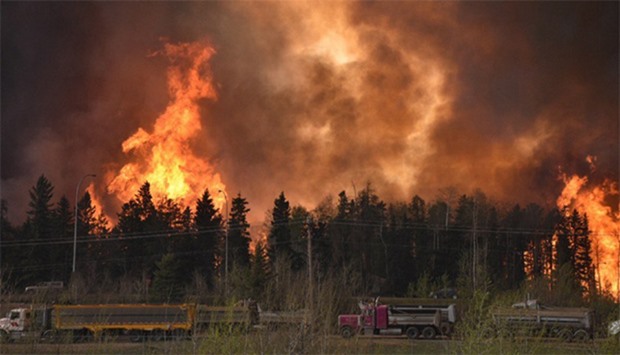* Fire affects some operations at oil sands facilities
* Fuel tanker sent to aid stranded motorists
Firefighters in Fort McMurray, located in the north-eastern part of the province of Alberta in the heart of Canada's oil sands region, confronted another tough day as hot, dry weather made it difficult to bring the fire under control.
While major oil sands facilities were not in the fire's path, the blaze disrupted some operations. Royal Dutch Shell PLC said one of its oil sands mines was closed and another was in the process of being shut down. Suncor Energy Inc , whose oil sands operations are closest to the city, said it was reducing crude production.
The regional government on Tuesday ordered the evacuation of all city residents, and some 44,000 had fled by late Tuesday, local officials said, but getting out remained difficult.
A highway closure on Tuesday forced most evacuees to drive north, away from major cities. By Wednesday morning, the highway had reopened, but fuel had run out, stranding evacuees seeking to drive out of Fort McMurray. Alberta's transportation department said it was escorting a fuel tanker north to help stranded drivers.
Images from the neighbourhood of Beacon Hill in the city's southeast showed rows of charred house foundations, their upper stories burned to the ground, and blankets of white ash within. Officials said 80 percent of houses in the neighbourhood, nearly 600 in total, were destroyed.
The regional government said two other neighbourhoods, Abasand and Waterways, had sustained "serious loss." Abasand is home to nearly 4,900 people, and Waterways more than 600, according to a 2015 municipal census.
The fire broke out southwest of the city on Sunday, then shifted with the wind to enter the city on Tuesday. A forecast of potential fire intensity showed much of the area at class 6, the highest possible level.
No injuries or deaths were reported. Canada's defence minister said "all assets were available" to help.
Chantelle Desjarlais, a security guard for Enbridge Inc in Conklin, Alberta, south of Fort McMurray, said evacuees were checking into the community's work camps.
Evacuees at the work camps and gas stations, many of whom left without the chance to take many belongings with them as the fled, appeared lost and sad.
"The parents looked like they were trying to be happy for the kids," Desjarlais said. "I was crying when I was having breakfast because I was seeing the little kids and I just couldn't say anything."
Gas stations some 50 km (31 miles) south of Fort McMurray were depleted Tuesday night, and nearly 3,000 evacuees took refuge in the Anzac Recreation Centre in Wood Buffalo. Outside, motorists formed long lines as they waited for fuel.
Officials said their priority was protecting people and preserving key infrastructure, including the city's only bridge over the Athabasca River and Highway 63, the only route in and out of town.
OIL SANDS OPERATIONS
Many workers in oil sands facilities were under evacuation orders and some will likely lose their homes.
The reduced oil sands production resulting from the fires was seen supporting global oil prices. Alberta is the biggest source of U.S. oil imports.
The oil sands accounted for roughly 2.2 million barrels per day, 60 percent of overall Canadian crude oil output in 2014, according to industry statistics.
"What we are hearing is that the wildfires aren't necessarily at this point threatening the actual production facilities but they are cutting back on production to free up time for the workers, and so they are reducing production," said Paul Ferley, assistant chief economist at Royal Bank of Canada. "Come May GDP there will probably be a hit from the wildfires, but we will have to see how long it persists."
A maintenance contractor working at Imperial Oil's Kearl oil sands mine, around 70 kilometers north of Fort McMurray, said evacuees from the city started arriving last night.
"It's crazy here right now. The biggest issues (are) food and water for Fort Mac refugees at camps, and fuel, gas and diesel. The site is running out of fuel so we aren't working today," he said, asking not to be named because he is not authorized to speak to the media.
A spokeswoman for Imperial said there had been no direct impact on the Kearl operation.
Alberta could be in for long and expensive wildfire season this year as it is much drier than normal after a mild winter with lower-than-average snowfall and a warm spring.

